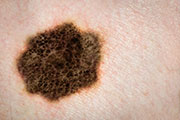- Could Your Grocery Store Meat Be Causing Recurring UTIs?
- Are You Making This Expensive Thermostat Error This Winter?
- Recognizing the Signs of Hypothyroidism
- 10 Strategies to Overcome Insomnia
- Could Artificial Sweeteners Be Aging the Brain Faster?
- Techniques for Soothing Your Nervous System
- Does the Water in Your House Smell Funny? Here’s Why
- Can a Daily Dose of Apple Cider Vinegar Actually Aid Weight Loss?
- 6 Health Beverages That Can Actually Spike Your Blood Sugar
- Treatment Options for Social Anxiety Disorder
Use Your ‘ABCDE’ to Spot Deadly Skin Cancer


As pools and beaches beckon this summer, be sure to protect your skin against the sun’s rays and remember that early detection is the best way to prevent and successfully treat the deadly skin cancer melanoma.
The “ABCDE” method of identifying the disease remains highly effective, according to experts at NYU Langone Medical Center in New York City.
The medical center is where the ABCDEs for melanoma detection were developed. The original
ABCD guide was created in 1985 and the E was added nearly 20 years later.
“The impact of the ABCDEs has been profound, creating a simple and quick guide for anyone to examine themselves. Few would argue that countless lives have been saved by the development and awareness of the ABCDEs–helping detect the most dangerous form of skin cancer while still curable with simple removal before the cancer has spread,” Dr. Seth Orlow, a professor of pediatric dermatology and chair of department of dermatology, said in a Langone news release.
The ABCDEs for melanoma detection are:
- Asymmetry: one-half of the mole is unlike the other.
- Border: the mole is irregular, scalloped or poorly defined.
- Color: a mole has variations in color from one area to another or has different shades of tan, brown, black and sometimes white, red or blue.
- Diameter: a mole is bigger than the size of a pencil eraser.
- Evolving: a mole that changes in size, shape or color.
“Performing regular skin self-examinations using the ABCDE guide to check for warning signs of skin cancer, especially melanoma, is an important and easy way to detect suspicious lesions and spots that could be cancerous,” Dr. Jennifer Stein, associate director of the Pigmented Lesion Service at Langone, said in the news release.
More information
The American Cancer Society has more about melanoma.
Source: HealthDay
Copyright © 2026 HealthDay. All rights reserved.










